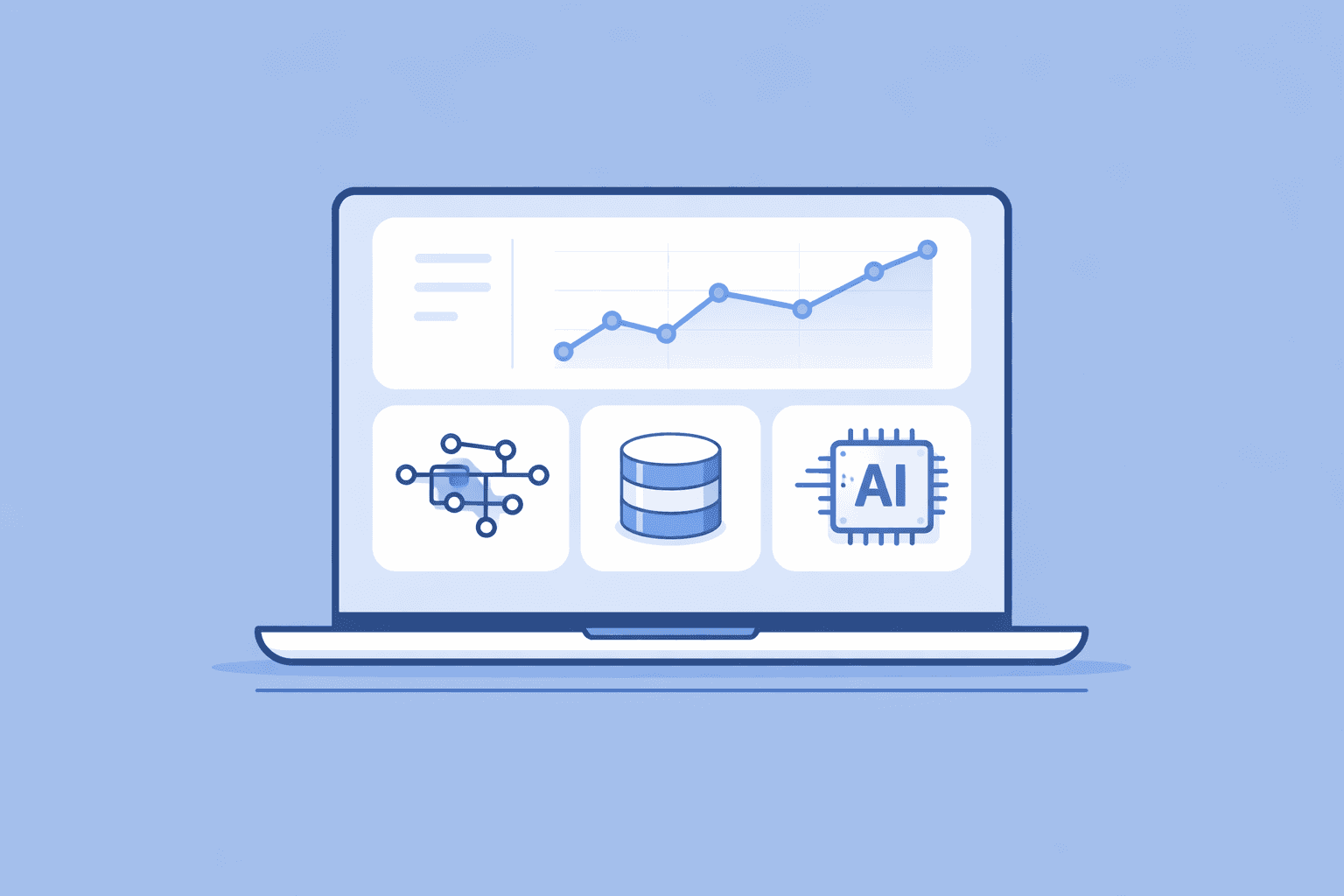Will We Still Need Data Engineers in 2026?
Will AI replace data engineers? Explore what automation can and can’t do, and why data engineers remain essential in the age of AI, especially by 2026.

As we step deeper into the AI-driven era, many are asking an important question: Will we still need data engineers in 2026? With the rapid rise of automation, artificial intelligence, machine learning, and advanced cloud platforms like AWS, some speculate that many traditional data engineering tasks could be automated or absorbed by AI-powered tools. Automated ETL pipelines, self-optimizing data warehouses, and intelligent data integration platforms are evolving quickly, leading to concerns that the demand for skilled data engineers may decline.
However, the reality is far more nuanced. While certain repetitive tasks may become automated, the complex responsibilities of data engineers — such as architecting data systems, ensuring data quality, handling governance, and integrating diverse data sources, remain critical for organizations navigating the expanding world of big data
AI can automate data work.
Data engineers own the decisions behind it.
What Is Data Engineering?
Before we dive into the future, it's essential to understand what data engineering is. Data engineering is the process of building systems that help businesses collect, store, and organize data so it can be used effectively. Whenever a company gathers information, like customer details, sales data, or website activity, data engineers make sure it’s clean, structured, and ready for use.
They create data pipelines (often called ETL: Extract, Transform, Load) that move data from one system to another, fix errors, and prepare it for analysis. Data engineers also manage where the data lives, such as in data lakes or data warehouses, and ensure it stays secure, accurate, and accessible.
In simple terms, data engineers turn messy data into useful information, making it ready for AI tools, reports, and decision making.
The Growing Demand for Data Engineering Jobs
Despite concerns about AI replacing certain roles, the demand for data engineering jobs has never been higher. According to recent trends, searches for data engineering have surged, reflecting its growing importance. In fact, platforms like AWS have popularized specialized fields such as AWS data engineering, where professionals manage vast cloud-based data infrastructures.
Moreover, companies continue to invest heavily in data platforms like Apache Spark, which requires skilled engineers to deploy, tune, and maintain for real-time data processing and big data analytics.
What Big Data Means for the Future
The era of big data is far from over. Every day, businesses create huge amounts of information, from customer details and sales numbers to social media posts and sensor data. Understanding what big data means is crucial — it’s not only about the size of the data, but also about how fast it comes in (velocity), the many different types it comes in (variety), and how complicated it is to manage (complexity).
To handle all this information, companies need advanced systems and skilled professionals who can design and manage them. This is where data engineers play a key role. They choose between data lakes vs data warehouses depending on the business needs. Data lakes store large amounts of raw, unorganized data, while data warehouses store clean, structured data that’s ready for quick analysis. Data engineers also ensure the data is reliable, secure, and easy to access, making it useful for business decisions, reporting, and AI systems.
As businesses continue to collect more types of data from more sources, the need for expert data engineers to manage and organize this information will only grow.
Data Engineer Skills That Actually Matter in 2026
In 2026, data engineers aren’t judged by how fast they write dbt models or Airflow DAGs.
They’re judged by how well they turn data into business value, and how safely they use AI in production.
AI didn’t replace data engineers.
It replaced busy work.
1. Data Modeling Matters More Than Code
AI can generate pipelines in seconds.
What it can’t do is understand your business unless you explain it.
You can ask an AI tool to create an SCD Type 2 pipeline and get working code instantly. But if you don’t understand when SCD2 is the right choice, you won’t notice costly mistakes.
Good data engineers know how data models work.
Great data engineers know which model fits the business problem.
AI builds what you ask for.
You’re responsible for the blueprint.
2. Architectural Thinking Beats Syntax Mastery
Perfect SQL formatting doesn’t move the needle anymore.
What matters in 2026 is your ability to:
Design scalable data platforms
Choose between batch, micro-batch, and real-time processing
Understand trade-offs between cost, latency, and reliability
Connect ingestion, modeling, serving, and governance
Strong data engineers think in systems, not scripts.
If you can’t explain your data architecture on a whiteboard, you’re too zoomed in.
3. Prompting Is a Core Engineering Skill
You don’t write every test or validation by hand anymore.
You direct AI to write them for you.
But vague prompts lead to fragile pipelines.
Weak prompt:
“Check timestamp issues”
Strong prompt:
“Validate that session_end is at least 1 second after session_start, ignore sessions shorter than 5 seconds, and log failures to a QA table.”
Clear intent.
Defined edge cases.
Actionable output.
That’s senior-level prompting.
4. Business Context Separates Juniors from Seniors
AI doesn’t understand your business metrics.
You do.
If you don’t know:
How sales defines conversion
Why marketing needs real-time data
What finance means by “active customer”
You’ll ship pipelines that are technically correct—but strategically wrong.
Great data engineers translate business rules into data logic before writing code.
5. Learn Concepts, Not Just Tools
Tools will change.
Frameworks will change.
AI models will change.
Concepts won’t.
A simple rule for 2026:
Whenever AI builds something, identify the pattern behind it.
If you only learn how to use AI tools, you’ll plateau.
If you understand the ideas they implement, you’ll stay valuable.
The Rise of Data Mesh and New Paradigms
One emerging trend is the concept of data mesh — a new way of organizing data where different teams inside a company take ownership of their own data, treating it like a product they manage and improve. This approach helps businesses move faster and scale more easily because teams can work independently. However, it doesn't mean that data engineers are no longer needed. In fact, their role becomes even more important.
Instead of controlling everything from a central point, data engineers now focus on building the tools, platforms, and rules (called governance frameworks) that allow teams to handle their data safely and correctly. They also ensure that data from different teams can still work together smoothly, keeping the entire organization’s data reliable and useful.
Data Engineering Salary & Pay Outlook
Financial incentives for pursuing a career in data engineering remain strong. The average data engineering salary and data engineering pay continue to rise as businesses compete for skilled professionals. Because there aren’t enough experienced data engineers to meet the growing demand, companies are willing to offer attractive pay packages to hire and keep talent.
In many regions, data engineering salaries are now similar to or even higher than those of software engineers. Special skills such as AWS data engineering, working with cloud platforms, or using tools like Apache Spark for big data processing can bring in even higher salaries. As more companies realize the value of managing data effectively, the earning potential for data engineers is expected to keep increasing well beyond 2026.
Will AI Replace Data Engineers?
It's true that automation and AI are increasingly taking over repetitive tasks. For example, AI-driven ETL tools can help move and organize data more easily. Some tools can even fix data errors or spot patterns automatically. However, the idea of AI replacing data engineers entirely is unlikely, at least by 2026. While AI can assist with routine work, it still lacks the human touch needed for creative problem-solving, understanding the unique needs of each business, and designing the right data systems.
Data engineers know how to handle messy data, build flexible systems, and make sure everything works smoothly as businesses grow and change. In fact, as AI creates even more data, skilled data engineers will be more important than ever to manage and guide these complex systems.
“AI can suggest schemas, but it doesn't understand business logic. That’s where data engineers come in.”
— Lead Data Engineer, Fintech Sector
Real-World Example: Where AI Falls Short
In a real-world migration project for a retail client, an AI tool correctly identified the data source schema, but failed to understand product-specific transformation logic. A data engineer stepped in to apply customer segmentation logic that AI couldn’t infer from metadata alone.
Frequently Asked Questions (FAQ)
Will AI replace data engineers completely?
AI will not replace data engineers completely. While AI can automate repetitive tasks like basic data transformations or anomaly detection, it lacks business context, architectural decision‑making, and accountability, areas where experienced data engineers are essential.
What data engineering tasks can AI automate today?
AI can assist with schema suggestions, data quality checks, basic ETL generation, and monitoring alerts. However, these tasks still require human validation, customization, and oversight to ensure they align with real business requirements.
Why are data engineers still needed in the age of AI?
Data engineers provide domain knowledge, system design expertise, and governance oversight that AI cannot replicate. They ensure data pipelines are scalable, compliant, and aligned with long‑term business strategy.
How will the role of data engineers evolve by 2026?
By 2026, data engineers will increasingly act as AI‑augmented architects, focusing on orchestration, observability, data governance, and advanced pipeline design rather than manual data processing alone.
Should aspiring data engineers be worried about AI replacing their jobs?
Aspiring data engineers should not be worried if they continue to upskill. Engineers who learn to work with AI, using it as a productivity and reliability tool, will be more in demand, not less.
Read our blog on: Data Science VS Data Analytics What You Need To Know.
Conclusion: The Future Is Bright for Data Engineers
By 2026, data engineering will continue to grow and change, but the role itself will remain very important. As companies gather more data from different sources, the systems needed to organize and use that data will become even more complex. Businesses will need skilled data engineers to design strong and scalable systems, build reliable ETL pipelines, and manage both cloud and on-site data storage (known as hybrid data environments).
While some tasks may be automated, the demand for professionals who can solve problems, ensure data quality, and adapt to new technologies will only increase. Simply put, data engineers will be more valuable than ever.




